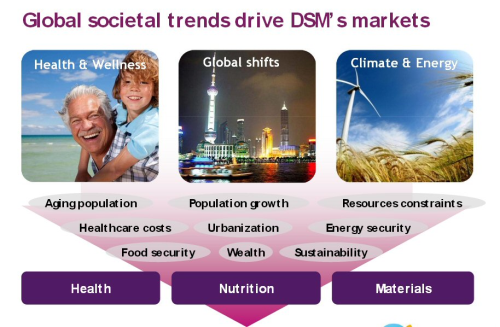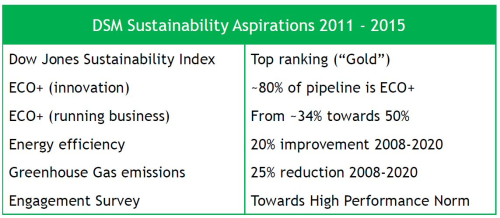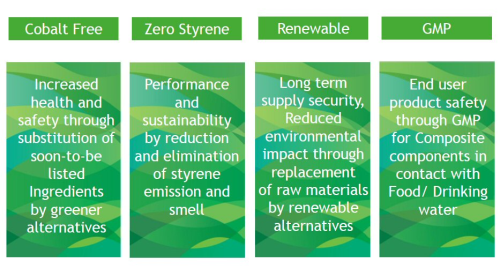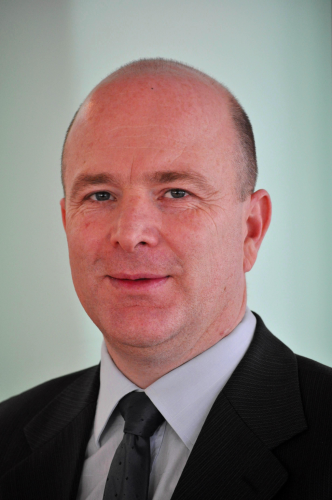



This lightweight bridge in the Netherlands is an example of DSM Composite Resins' products in action.
“Making sure that we continue to deliver new solutions to our customers” is how Robert Puyenbroek describes his job.
Puyenbroek is responsible for DSM Composite Resins’ global R&D activities, from the longer term breakthrough innovations, through medium-term research and application developments, to short term, day-to-day tech service support.
He works with a global team, based in three R&D centres in Holland, Italy and China, on a list of projects developed by merging the priorities of the business with internal ideas. Activities range from global programmes, through to shorter term, regional projects.
Group synergies
Over recent years DSM has transformed itself from a chemicals company to today's life sciences and materials sciences company, with a focus on health, nutrition and materials (see Figure 1). It reported net sales of €9.1 billion in 2012. Its products range from additives for animal feed, to pharmaceuticals, to materials used in car manufacture.
As a manufacturer of unsaturated polyester and other resins for the composites industry, DSM Composite Resins has synergies with other parts of the group. It is part of DSM Resins, which also supplies resins for paints and coatings. Another business unit, DSM Engineering Plastics, supplies thermoplastic resins, including Stanyl® polyamide (PA) 46 and EcoPaXX® bio-based PA 410.
“These are separate business units, but they come together from an R&D perspective,” notes Puyenbroek. “We share the technology we use, and we also share the issues we face. So if we have challenges on new developments, we look to see if there is any expertise or synergy with our colleagues’ businesses.”
“Coating resins are a different application area, but the technology is very similar,” he continues. “With thermoplastics, we are competing with each other in certain markets. Working together we can clearly define opportunities. Where we see gaps in the market, or where there are customer needs, we also sit down together and see what is the best approach, from a thermoplastic or a thermoset perspective.”
There are also opportunities to collaborate with the DSM life sciences businesses, where there is a strong focus on bio-based technologies.
“If you look forward to the next 5, 10, 20 years, the key focus will be renewables, and being less dependent on fossil fuels, and DSM can help us with new routes to get raw materials from renewable resources that we can base our resins on.”
Sustainability is key
Sustainability is a core value for DSM and also its main business driver. This focus comes from the top, led by CEO Feike Sijbesma, a well-known advocate of long term sustainability for global business. DSM has headed the Dow Jones Sustainability World Index several times and aims to do so again, and it has clear sustainability targets (see Figure 2).
"We have clear metrics defined for all of the developments we do, not just in R&D, but throughout the business," Puyenbroek explains. "For instance, any new product must be ‘eco-plus,' that is, more eco-friendly than the current solution."
The main criterion the company uses is lifecycle analysis (LCA). It also works with partners and external bodies in driving independent LCAs, comparing composites to mainstream materials. For example, DSM Composite Resins recently collaborated with Fiberline Composites to produce an LCA which demonstrates that the carbon footprint of window frames made from pultruded composite profiles can be substantially lower than that of equivalent aluminium profiles.
"For every new development we do a lifecycle analysis," Puyenbroek reports. "We compare it to the current materials that are used. If that is positive, then we continue. If it’s not positive, or any better, we have another discussion to see how this would evolve in the future.”
DSM also looks carefully at the materials it uses. It does not use materials labelled as harmful (e.g. carcinogenic, mutagenic, reprotoxic etc.), and if they are already used in its products, it tries to replace them.
Composites innovation
In line with this overall group strategy, the Composite Resins business' focus on 'innovation for sustainability' is based around four areas:
- zero styrene;
- cobalt-free;
- good manufacturing practice (GMP); and
- renewables (see Figure 3).
It is making progress in all these areas. 2011 saw the launch of a resin compliant with European regulations on food contact, which is manufactured using the GMP quality assurance process (see: Resin meets European food contact regulations). Towards the end of that year the Atlac® Premium range of styrene-free resins was launched (see: DSM launches range of styrene-free resins) and BluCure™ cobalt-free curing technology was introduced in 2012, in partnership with AkzoNobel (see: AkzoNobel and DSM launch BluCure cobalt-free curing technology). Resins containing renewable raw materials for automotive applications and artificial stone are also available (see: DSM introduces bio-based automotive resins and Compac introduces artificial stone featuring DSM bio-based resin) and Puyenbroek reports there is now a bio-based product for use in bridge construction.
Earlier this year Composite Resins unveiled its latest development – a styrene-free, cobalt-free resin with 40% bio-content. The Beyone™ 1 resin is said to combine the ease of processing typical for polyester and vinyl ester resins with the strength and fatigue resistance of epoxy resins. It is designed for use in the vacuum infusion processes employed in building and construction, marine and especially wind energy applications. The resin's chemistry is proprietary and DSM is currently testing it with a number of customers. Market introduction could potentially take place in 2014-2015. (See: DSM introduces styrene-free, cobalt-free resin with bio content.)
The creation of styrene-free and cobalt-free products is driven by the threat of legislation restricting the use of these chemicals (see ACMA opposes listing of styrene as 'reasonably anticipated’ carcinogen and Cobalt-free curing taking off), but Puyenbroek admits it is difficult to predict the outcome of the discussions currently taking place.
"I think it’s very important to mention that styrene is still safe to use," he says. "If you use the right protection, there is no issue in using styrene, and there is no issue with cobalt, if you use it in the right way. But I think in a few more years you’ll see more and more pressure on these materials, and you’ll see more and more pressure on being sustainable, so I think it’s a matter of time. Our customers (including OEMs and end-customers) are clearly asking for materials that are more sustainable than the current solutions."
Composite Resins will also continue to serve its core business of styrene-containing resins, Puyenbroek emphasises.
|
Robert Puyenbroek is the Global R&D Director of DSM Composite Resins, one of the business units within the life and material sciences company DSM. Composite Resins is a leading company in the composites market and Puyenbroek leads its R&D activities across Europe, China and India. He was appointed to this role in January 2009. Prior to this Puyenbroek was Global Technology Manager Cycoloy & Polycarbonate-Blends, one of the main engineering thermoplastic areas within SABIC Innovative Plastics (formerly known as GE Plastics). Over the past 18 years Puyenbroek led Global R&D teams in the field of high performance engineering thermoplastics and the film and sheet business, with assignments in the USA and the Netherlands. Puyenbroek graduated from the University of Groningen, the Netherlands, with a PhD in Polymer Science. He has authored numerous technical papers and patents on engineering thermoplastics and silicon-containing polymers. |
DSM and composites
"We’re focused on styrene-free, but of course we still develop our core business. It’s still very important to help our current market and current customers. So it’s a two-way approach: on one side, we make sure we have solutions for the future, that for us is very important; but in the short and medium term, we take care of our customers’ needs and continue to develop and grow our portfolio of styrene-containing resins."
Puyenbroek emphasises that DSM is committed to the composites industry.
"I think this is confirmed by our strategy. We do not only do the short term activities and maintain our business, we really try to grow this business by innovation, because we believe that’s the way to stay committed to the industry, and also to stay healthy in this industry."
In terms of how DSM Composite Resins' innovation activities differ from its competitors Puyenbroek points to a number of factors.
"We have a long history of innovation and we invest in innovation. Over the last three years, when we had the recession and the crisis coming up in 2008, I think we even accelerated our innovation efforts. We invest, we have the resources and the expertise. We also have DSM and its fundamental research as a back-up. We have strong connections with the external world, in universities and all kinds of partnerships, and we continue to do this. I think that’s one side that stands out from our competitors."
"Also, we also focus very much on our intellectual property (IP). We have a strong IP position, in cobalt-free technology and also styrene-free. I think we have a strong intellectual property strategy, with which we also can make ourselves different in the industry."
Puyenbroek notes that there are new products in the pipeline for launch in 2013.
"We have a whole portfolio of styrene-free products for relining, and you can also expect a new styrene-free grade for relining for drinking water applications, which will be commercialised in the next couple of months. ♦
Also see:
- DSM demonstrates carbon footprint reduction in composite recycling through cement co-processing;
- New resins help meet global trends;
- Composite panels clad energy-neutral office in the Netherlands.
This article will be published in the July/August 2013 issue of Reinforced Plastics magazine.
The digital edition of Reinforced Plastics is distributed free of charge to readers who meet our qualifying criteria. You can apply to receive your free copy by completing the registration form.




